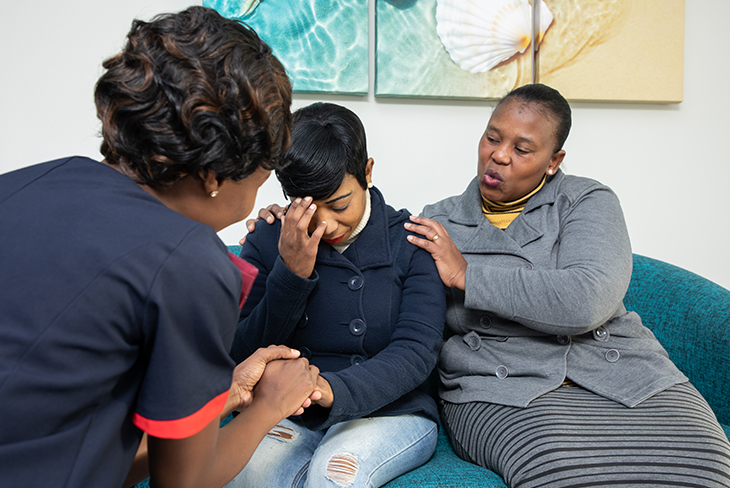When is mental health a medical emergency?

Mental health emergencies could occur when suicide is attempted, a patient is experiencing a severe psychotic episode or substance abuse has led to physical or mental trauma, putting the person and others in danger. Psychiatrist Dr Chané Magnus explains what happens in the case of a psychiatric emergency admission
‘A mental health emergency requires urgent medical attention,’ says Dr Chané Magnus, a psychiatrist at Life Poortview.
‘A medical emergency is a condition which endangers life and/or causes great suffering to the individual,’ explains Dr Magnus. ‘Mental health emergencies share this description, but, in addition, the patient has disturbances of thought, mood and psychomotor activity which pose a threat to their existence or to the people in their community.
‘The main objectives of emergency intervention are to safeguard the life of the patient and the community,’ he adds.
Types of psychiatric emergencies
- suicide/deliberate self-harm
- violence or agitation/excitement
- stupor/catatonia
- substance intoxication or withdrawal
- alcohol/drug abuse
- delirium
- severe depression/psychosis with suicidal or homicidal tendencies, agitation or stupor.
‘The greatest potential error in the presentation of mental health emergencies is overlooking a physical or medical illness as the cause of a psychiatric condition,’ says Dr Magnus.
‘Head trauma, numerous medical conditions, cerebrovascular disease, cardiac conditions, neurological disorders, metabolic abnormalities and prescription medication may all cause abnormal behaviour. A detailed medical history is of the utmost importance in this situation.’
Hospital admission
‘All mental health emergencies will require hospitalisation,’ says Dr Magnus. Patients who present with an underlying medical condition as a cause of abnormal behaviour are stabilised by emergency unit physicians and referred to a specialist facility.
Case-by-case care
‘True’ mental health emergencies are managed on a case-by-case basis. ‘There’s no standard treatment for a mental health emergency patient,’ says Dr Magnus. Overdose or severe self-harm is managed in a medical facility and, upon stabilisation, transfer to a mental health unit is arranged.
‘Not all patients accept assistance voluntarily,’ says Dr Magnus. ‘Under these circumstances, the patient may be admitted without their consent, i.e. involuntarily, to a specialised psychiatric facility, guided by the Mental Health Care Act No 17 of 2002, to safeguard the patient and the community.’
Priority mental health emergency: Suicide
‘Suicidality is our most common mental health emergency,’ says Dr Magnus. ‘One person dies by suicide every 40 seconds globally. In South Africa, there are 23 suicides recorded daily. For every completed suicide, 20 attempted suicides occur. Men are five times more likely to die by suicide than women.’
Who is at risk?
‘Factors associated with increased suicide risk include: age (adolescents, young adults, the elderly), drug/alcohol abuse, previous suicidal behaviour, gender (male), presence of a psychiatric disorder, recent loss or separation, loss of physical health, social isolation and unemployment,’ says Dr Magnus.
Warning signs
‘Seventy-five percent of all suicides give some warning of intent to a friend or relative, for example [saying] “I can’t take it any more” [or] “I wish I were dead”, giving away prized possessions, social withdrawal, loss of interest in most activities, preparing a will and neglecting personal hygiene,’ says Dr Magnus.
Busting myths
Common misconceptions about suicide include:
- people who talk about suicide don’t complete suicide;
- once a person decides to die by suicide nothing can be done to stop them;
- all suicidal individuals are mentally ill; and (very importantly)
- talking about suicide with a suicidal person increases risk of suicide gestures.
Dr Magnus believes that we need to educate people about suicide myths and dispel the stigma associated with suffering from a mental health condition.
Download a list of useful resources for mental health treatment.
Life Healthcare’s emergency units are located at 41 Life Healthcare hospitals and offer emergency medical services 24 hours a day, seven days a week. Doctors, experienced nursing staff and specialists are available to ensure every patient receives the best emergency care.
Important: All our emergency units remain open at all times. Save your nearest Life Healthcare emergency unit contact details in your mobile phone in case of medical emergencies. Find a doctor near you.
The information is shared on condition that readers will make their own determination, including seeking advice from a healthcare professional. E&OE. Life Healthcare Group Ltd does not accept any responsibility for any loss or damage suffered by the reader as a result of the information provided.

